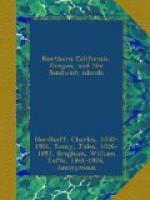It is plain that the Island trade is so largely in our hands that no other nation can be said to dispute it with us. If our flag flew over Honolulu we could hardly expect to have a more complete monopoly of Hawaiian commerce than we already enjoy. Moreover, almost all the sugar-plantations—the most productive and valuable property on the Islands—are owned by Americans; and the same is true of the greater number of stock farms.
Our political predominance on the Islands is as complete as the commercial. In the present cabinet all the ministers except one are Americans. This was true also of the cabinet of the late king. Of the Supreme Court, two of the judges are Americans, and one is German. Almost all the executive and administrative offices are in the hands of Americans or Hawaiians.
Nor can any foreign power rightly find fault with this state of things. What the Islands are they are because of American effort, American enterprise, American capital. American missionaries civilized them; Americans gave them laws wisely adapted to the customs and habits of their people; American enterprise and Boston capital established the sugar culture and other of the important industries; perhaps I ought to add that American sailors spread among the Islands the vices and diseases which, more than all else, have caused the rapid decrease of the population, and to combat and check which added toil and trouble to the labors of the American missionaries.
The government of the Hawaiian Islands consists of a king and a Parliament. The Parliament meets once in two years; and under the late king consisted of but a single House. The present king has promised to call together two Houses, of which but one will be elected. The other consists of “Nobles,” who are nominated or created by the king for life, but have no title nor salary unless they are called to office. By the Constitution the reigning king appoints his successor, but his nomination must be confirmed by the Nobles. As, however, he may at pleasure increase the number of Nobles, the appointment virtually rests with him. If he dies without naming a successor, the Parliament has the right and duty to elect a new sovereign.
There is a slight property qualification for voters, and a heavier one for members of Parliament.
The revenue of the Government, which amounts to about half a million per annum, is derived from the various sources specified in the official returns of the Minister of Finance, which I copy below. It must be understood that this report covers two years:
The balance in the Treasury at the close of the last fiscal period (March 31, 1870) was . . . . . . . . $61,580.20




